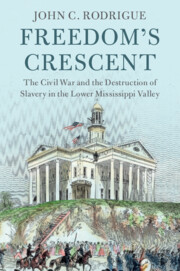Book contents
- Freedom’s Crescent
- Cambridge Studies on the American South
- Freedom’s Crescent
- Copyright page
- Dedication
- Epigraph
- Contents
- Figures
- Acknowledgments
- Abbreviations
- Additional material
- Introduction
- Prologue Life – and Labor – on the Mississippi
- Part I From War for Union to Military Emancipation, 1860–1862
- Part II From Military Emancipation to State Abolition, 1863
- Part III Abolition: State and Federal, 1864
- 10 “Slavery Is Incompatible with a Republican Form of Government”
- 11 Of Foul Combinations and the Common Object
- 12 “The Jewel of Liberty”
- 13 “The Virus of Slavery Is As Virulent As It Ever Was”
- 14 “No Longer Slaves but Freedmen”
- 15 “So Long As a Spark of Vitality Remains in the Institution of Slavery”
- 16 “Freedom, Full, Broad and Unconditional”
- 17 “To Resolve Never Again to Be Reduced to Slavery”
- Part IV The Destruction of Slavery, 1865
- Epilogue Memphis and New Orleans: May 1–3 and July 30, 1866
- Bibliography
- Index
12 - “The Jewel of Liberty”
from Part III - Abolition: State and Federal, 1864
Published online by Cambridge University Press: 19 January 2023
- Freedom’s Crescent
- Cambridge Studies on the American South
- Freedom’s Crescent
- Copyright page
- Dedication
- Epigraph
- Contents
- Figures
- Acknowledgments
- Abbreviations
- Additional material
- Introduction
- Prologue Life – and Labor – on the Mississippi
- Part I From War for Union to Military Emancipation, 1860–1862
- Part II From Military Emancipation to State Abolition, 1863
- Part III Abolition: State and Federal, 1864
- 10 “Slavery Is Incompatible with a Republican Form of Government”
- 11 Of Foul Combinations and the Common Object
- 12 “The Jewel of Liberty”
- 13 “The Virus of Slavery Is As Virulent As It Ever Was”
- 14 “No Longer Slaves but Freedmen”
- 15 “So Long As a Spark of Vitality Remains in the Institution of Slavery”
- 16 “Freedom, Full, Broad and Unconditional”
- 17 “To Resolve Never Again to Be Reduced to Slavery”
- Part IV The Destruction of Slavery, 1865
- Epilogue Memphis and New Orleans: May 1–3 and July 30, 1866
- Bibliography
- Index
Summary
The organization of a loyal government on a free-state basis in Louisiana in early 1864 under Lincoln’s ten-percent plan. Contrary to the free-state Unionists’ plan, General Nathaniel Banks orders an election for state executive officers before holding a constitutional convention to abolish slavery. In the campaign that follows, free-state Unionists split into “radical” and “moderate” factions, primarily over black political and legal rights but also over Banks’s interference. Conservative Unionists in Louisiana continue their campaign to restore Louisiana as a slave state, but Congress refuses to seat claimants elected in November 1863. Free-state moderate Michael Hahn is elected Unionist governor in March and takes office. In the planning for a state constitutional convention to abolish slavery, New Orleans free people of color advocate for voting rights, and Lincoln, after meeting with two black leaders, “privately” suggests to Hahn that Louisiana adopt limited black suffrage.
Keywords
- Type
- Chapter
- Information
- Freedom's CrescentThe Civil War and the Destruction of Slavery in the Lower Mississippi Valley, pp. 252 - 267Publisher: Cambridge University PressPrint publication year: 2023

